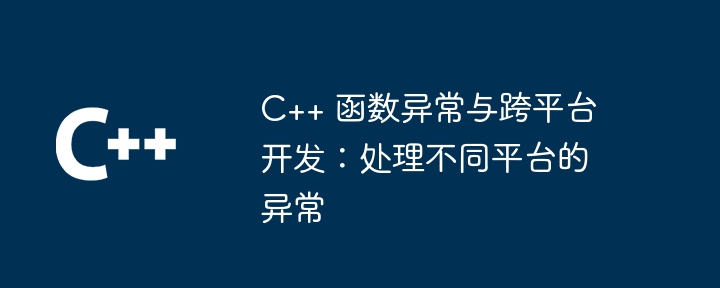Home >Backend Development >C++ >C++ function exceptions and cross-platform development: handling exceptions on different platforms
C++ function exceptions and cross-platform development: handling exceptions on different platforms
- 王林Original
- 2024-05-02 21:21:011145browse
Handling exceptions on different platforms is crucial in cross-platform development. C's exception handling mechanism allows exceptions to be thrown and propagated up the call stack. Developers can use dynamic_cast dynamic type conversion to handle different types of exceptions across platforms. For example, different exceptions are thrown on Windows and Linux systems, but they can be converted to a common exception type through dynamic_cast for handling.

C Function exceptions and cross-platform development: Handling exceptions on different platforms
In cross-platform development, handling exceptions on different platforms Exceptions are crucial. C provides a powerful exception handling mechanism that helps you handle errors gracefully and keep your code portable.
C Exception Handling
C Exception handling is based on the exception class hierarchy. When an error occurs, an exception is thrown and passed up the call stack until it is caught by an appropriate exception handler.
try {
// 可能会抛出异常的代码
} catch (const std::exception& e) {
// 捕获异常并进行处理
}Exceptions in cross-platform development
In cross-platform development, different platforms may use different exception types. For example, Linux systems typically use std::runtime_error, while Windows systems use HRESULT.
To handle exceptions across platforms, you can use dynamic_cast dynamic type conversion to convert one exception type to another.
Practical Case: Handling Windows and Linux Exceptions
Consider the following example where we want to handle exceptions that may be thrown on Windows and Linux:
#ifdef _WIN32
#include <windows.h>
struct WindowsException {
WindowsException(HRESULT hr) : hr(hr) {}
HRESULT hr;
};
#endif
#ifdef __linux__
#include <stdexcept>
struct LinuxException : public std::runtime_error {
LinuxException(const char* what) : std::runtime_error(what) {}
};
#endif
void foo() {
#ifdef _WIN32
// 抛出 Windows 异常
throw WindowsException(HRESULT_FROM_WIN32(ERROR_INVALID_PARAMETER));
#endif
#ifdef __linux__
// 抛出 Linux 异常
throw LinuxException("Invalid parameter");
#endif
}
int main() {
try {
foo();
} catch (const WindowsException& e) {
// 处理 Windows 异常
std::cout << "Windows error: " << e.hr << std::endl;
} catch (const LinuxException& e) {
// 处理 Linux 异常
std::cout << "Linux error: " << e.what() << std::endl;
} catch (...) {
// 处理未知异常
}
return 0;
}The above is the detailed content of C++ function exceptions and cross-platform development: handling exceptions on different platforms. For more information, please follow other related articles on the PHP Chinese website!

